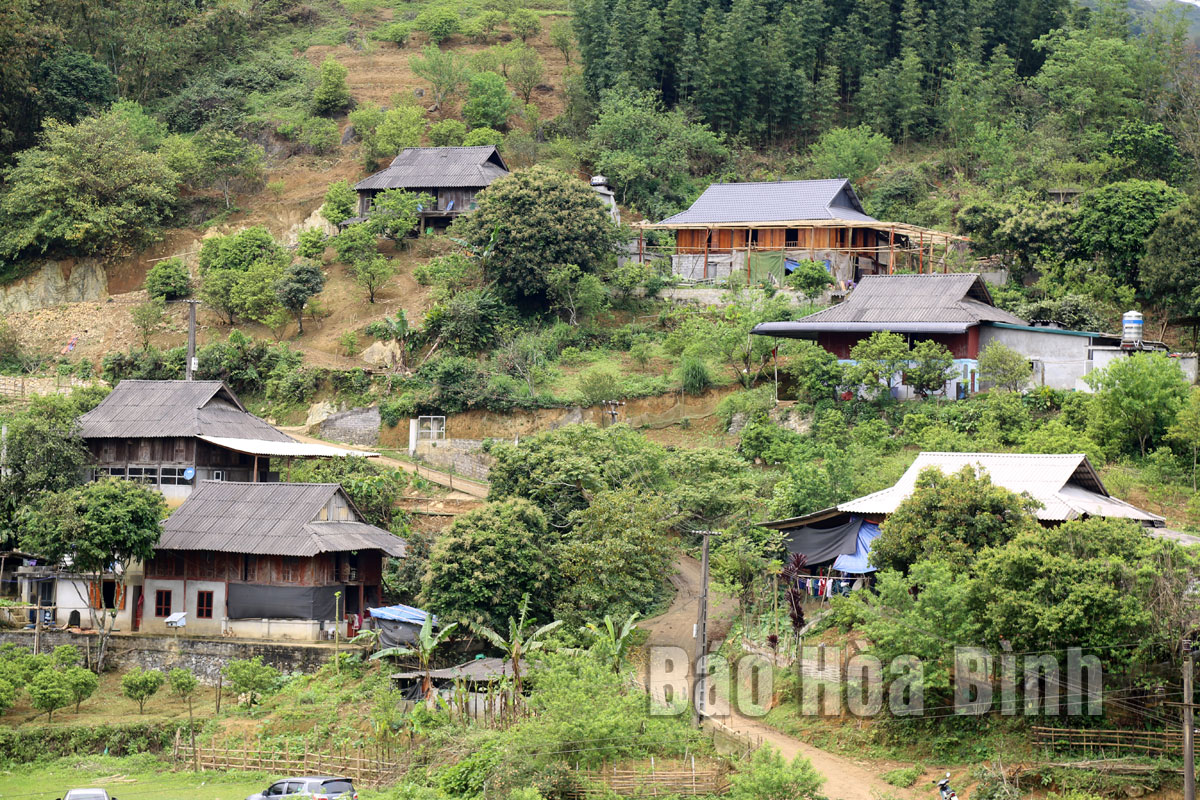
(HBO) - The life of people in Van Son commune (Tan Lac district) are changing day by day thanks to all-out efforts of the local authority and greater investment in infrastructure, agricultural development and community-based tourism.

A
community-based tourism village in Chien hamlet in Van Son commune (Tan Lac
district). The natural beauty and unique traditional cultural identities of the
locality have attracted many tourists.
The community tourism village in Chien hamlet is located about 4 km away from
the centre of Van Son commune at an altitude of around 800m above sea level. The village covers an area of 487 hectares, consisting of 74 households with
347 residents, who mainly make living by agricultural production such as rice
cultivation and raising livestock and poultry. Ancient pomelo gardens in Van Son commune are the highlight in the locality.
In addition to the traditional stilt houses of the Muong ethnic people which
have been preserved almost intact, the tradition of wearing traditional
costumes of people in Chien hamlet have been also restored.
Thanks to its unique cultural identity and potential in terms of geography and
human resources, since 2019, the locality was funded by the Australian
Foundation for the Peoples of Asia and the Pacific Limited(AFAP) to
implement a project on improving sustainable livelihoods through
community-based tourism development. The project benefits three households in the commune, helping them develop
homestay models to provide accommodation services for tourists.
Ha Van Than, owner of Hai Than Homestay, said his family welcomes about 100
visitors per month. Sixty out of 74 households in Chien hamlet have joined community-based tourism
activities in the locality.
The community-based tourism model in Chien hamlet has proven effective, attracting
numerous foreign and domestic tourists. Visitors to the hamlet love to join the
traditional dance and music performance programmes of the Muong ethnic people,
enjoy local foods, and visit beautiful landscapes in the locality.
Van Son used to be called Muong Cham. Later, people also called it poetic names
such as Thung May or Lung May. This is also one of the oldest and largest
cultural cradles of the Muong ethnic group in Hoa Binh. Van Son commune is also home to many natural landscapes, including Nam Son and
Nui Kien caves.
Nam Son cave is located in the buffer areas of Cuc Phuong National Park and
Ngoc Son - Ngo Luong Nature Reserve. It was recognised as a national landscape
relic in 2008. Meanwhile, Nui Kien cave was recognised as a provincial scenic
spot in 2019.
According to Vice Chairman of the People’s Committee of Van Son commune Ha Van
Ha, Van Son has a natural area of 5,553 ha. Agricultural and forestry production is the strength of the commune. Many
households have gradually changed their land for growing crops to growing
tangerines. The total area of tangerine cultivation in the locality increased more than
three times to 181.5 ha from only over 50ha in 2015, contributing to improving
incomes for local residents.
In terms of cultivation, the total cultivated area reached over 1,400 ha,
including 290ha of rice, and over 900 ha of maize. Total output of grain crops
reaches over 5,900 tonnes. Other crops are chayote (21.5 ha), sweet mandarin
(183.3 ha) and peach (43 ha).
In addition to farming, local residents have also focused on developing the
animal husbandryindustry. They maintained 452 heads of buffaloes, 1,983
cow heads, 1,650 pigs, 200 goats and 52,300 heads of poultry.
Policies towards ethnic minorities are well implemented through projects and
national target programme, contributing to gradually improving and raising the
living standards of local people. In 2022, the commune's average per capita
income reached 28.5 million VND. The rate of poor households stood at 29.72%./.
The Department of Education and Training of Hoa Binh province held a conference on March 18 to review the performance of the "Safe and Happy School" Project and set out tasks for 2025. The project, funded by the Taiwan Fund for Children and Families (TFCF), aims to create a safe, inclusive, and supportive learning environment for students. The event saw the attendance of representatives from the TFCF and 26 beneficiary schools.
With over 70% of their workers being women, trade unions across industrial parks (IPs) in Hoa Binh have been actively safeguarding their legal rights and interests while implementing initiatives to improve their income and well-being.
In recent years, the Hoa Binh provincial General Hospital has continuously innovated itself and improved the quality of medical services to meet the increasing needs of local people. With substantial investments in infrastructure and modern equipment, along with a team of highly qualified doctors and nurses, the hospital has gradually established itself as one of the leading medical units in the Northwestern region and a trusted destination for healthcare for people inside and outside the province.
From mastering the fundamentals of programming to achieving national recognition, the Programming Club of the Le Van Tam Primary School (STAR LVT28) in Hoa Binh city has made remarkable strides in the field of robotics.
The Ho Chi Minh Communist Youth Union Committee and the Vietnam Youth Federation chapter of Hoa Binh province organised a programme on March 12 to launch the "Digital Literacy" movement and an online quiz on the resolutions of the Vietnam Youth Federation congresses at all levels, as well as the Politburo's Resolution No. 57-NQ/TW on breakthroughs in the development of science, technology, innovation, and national digital transformation.
As climate change grows more unpredictable, the development of production forests has become essential - not just for economic growth, but for safeguarding the environment and maintaining ecosystem balance. By boosting local incomes, curbing natural disasters, preventing soil erosion, and protecting water resources, these forests play a crucial role in sustainable development.



